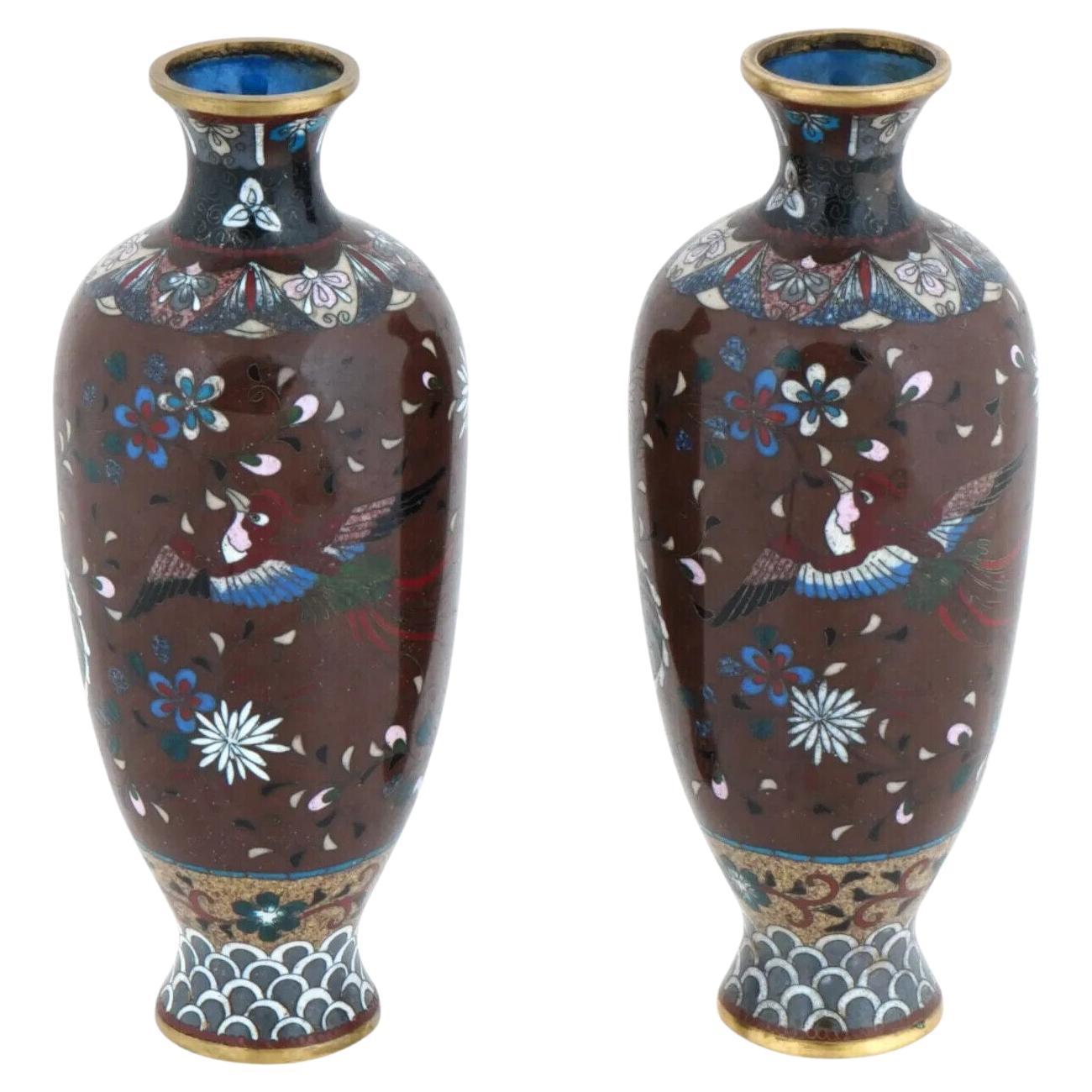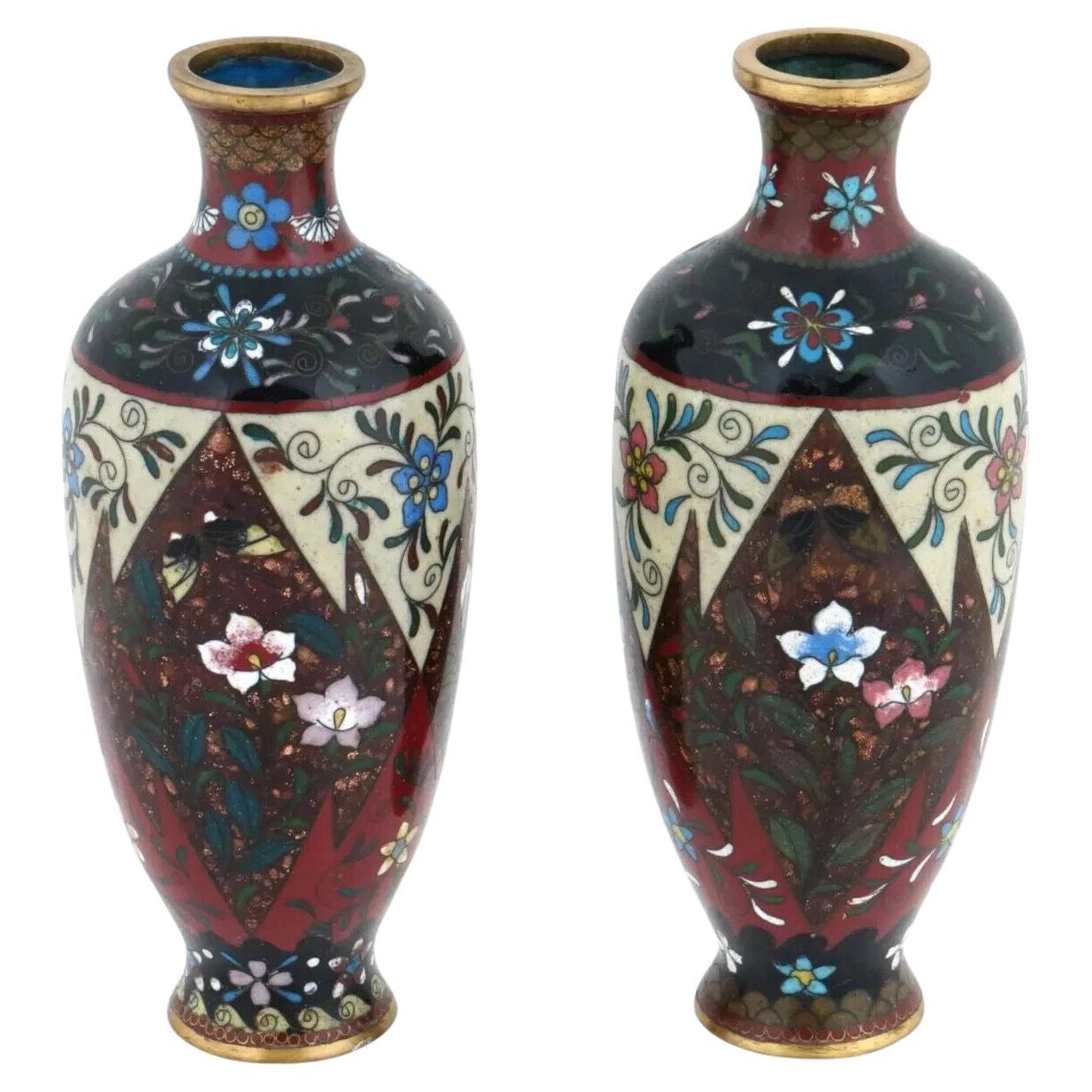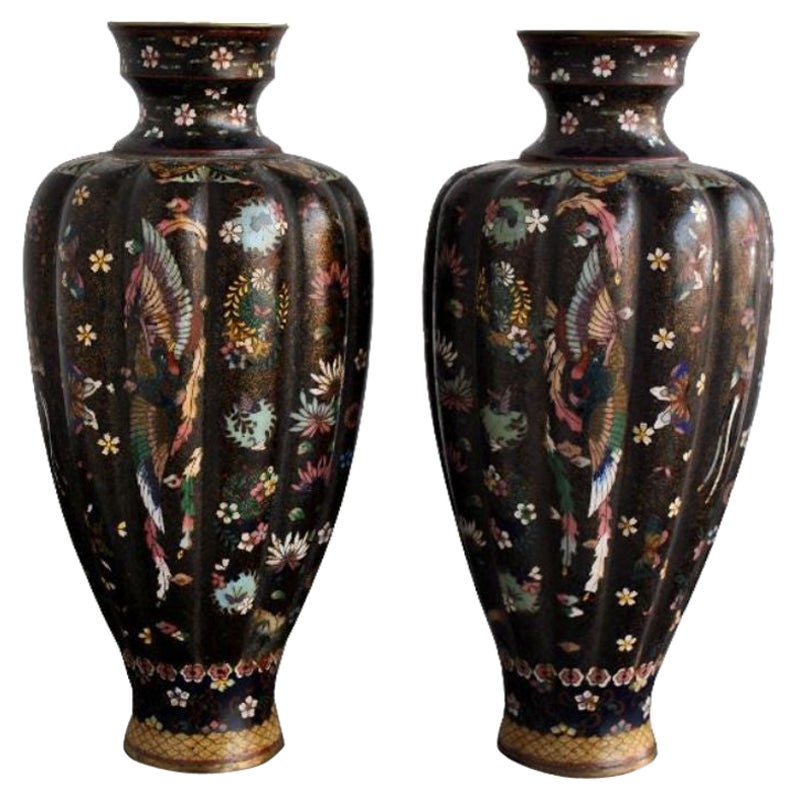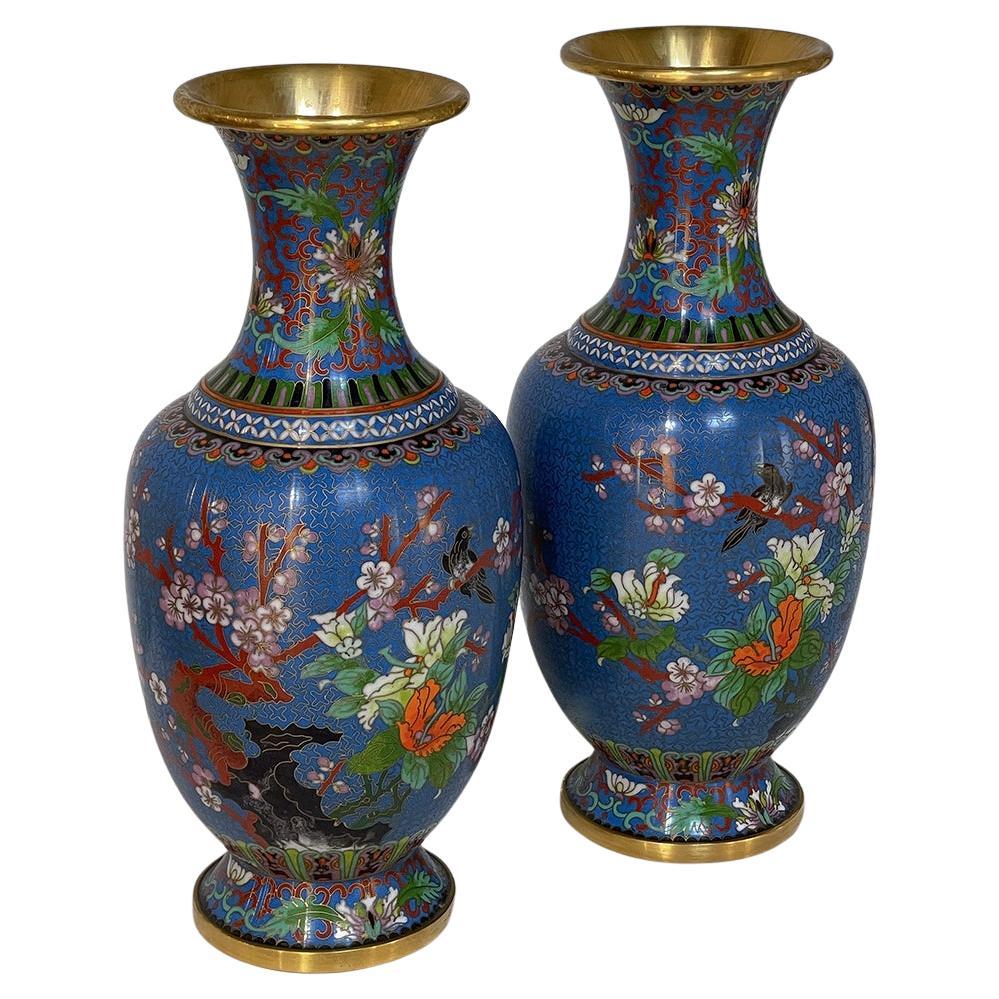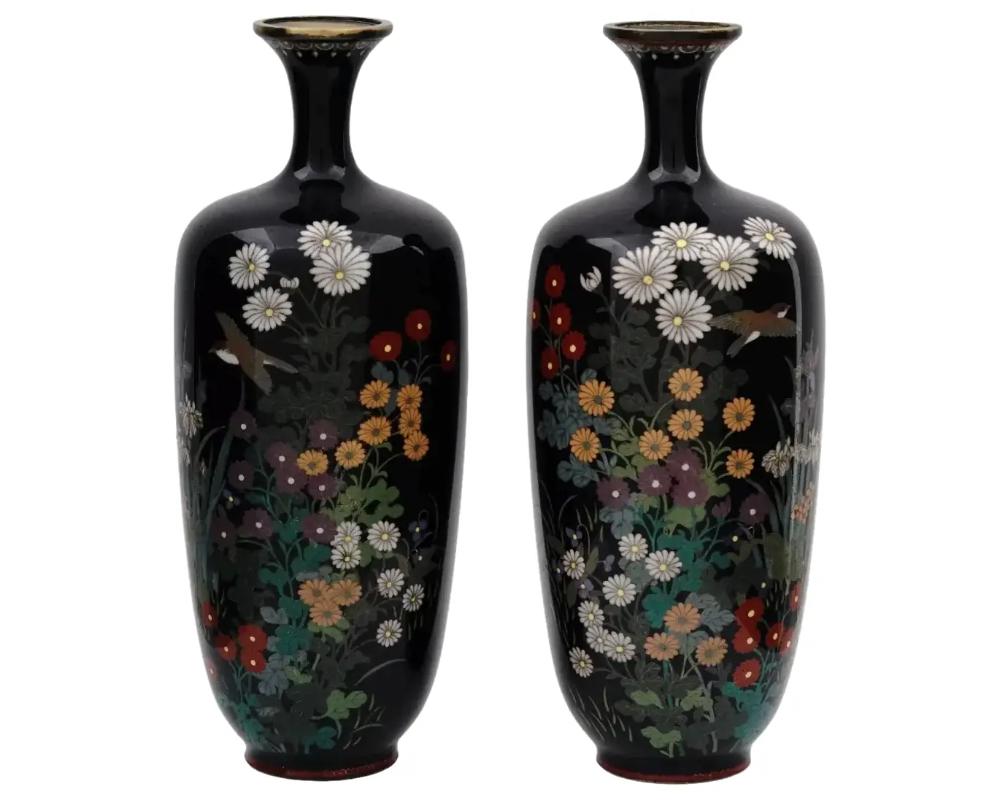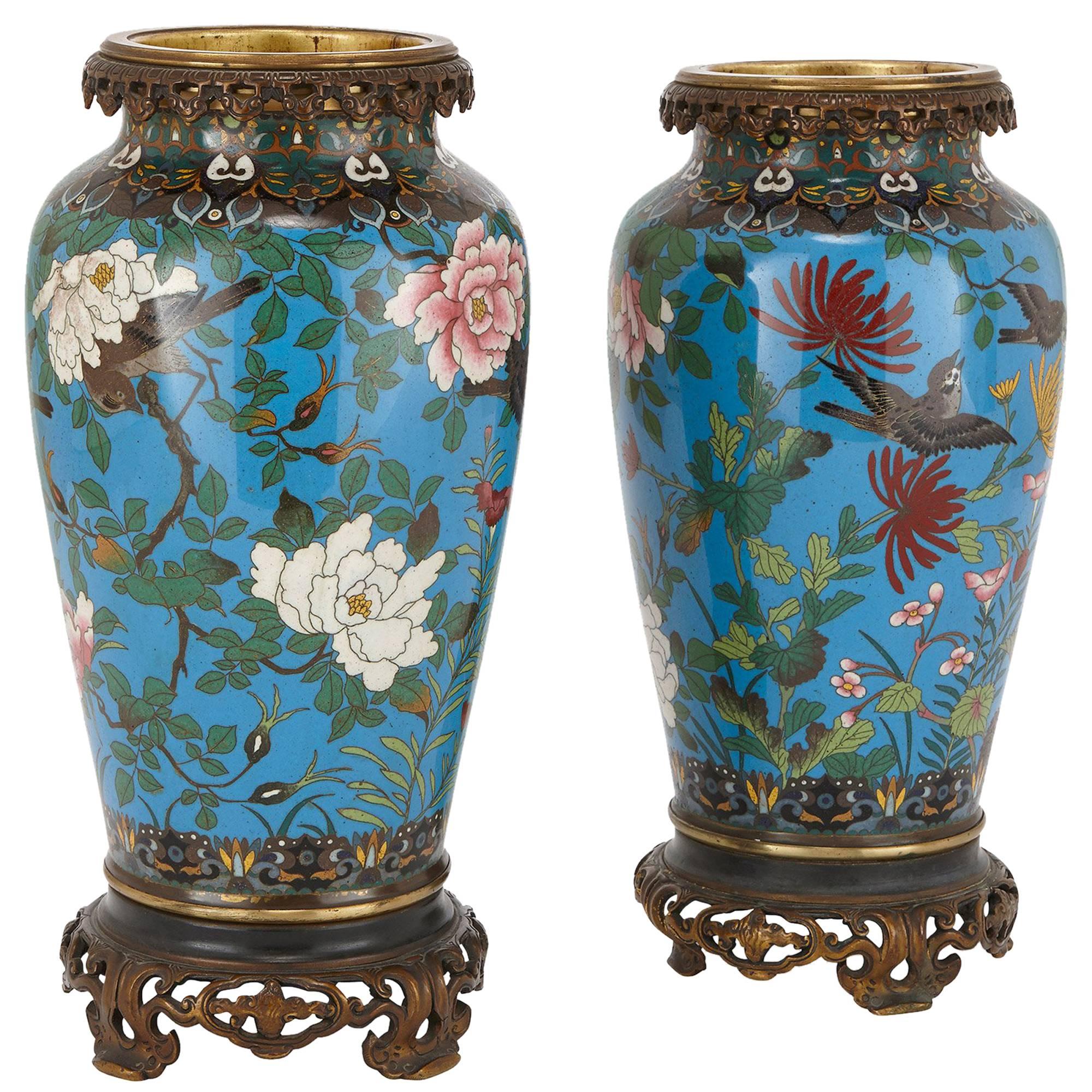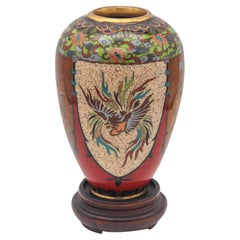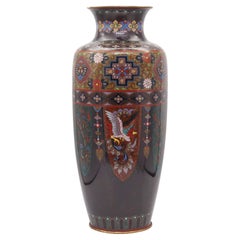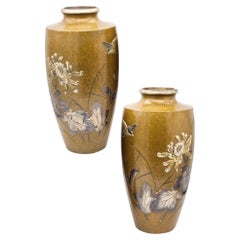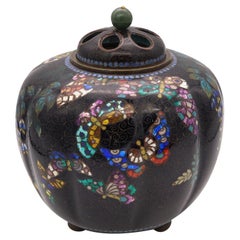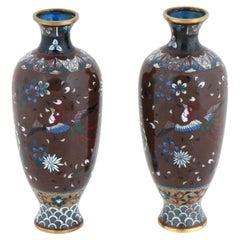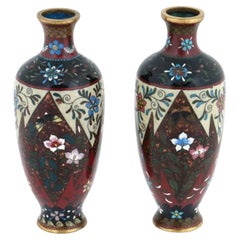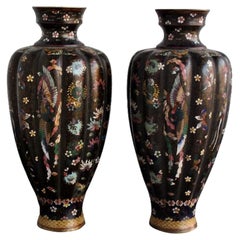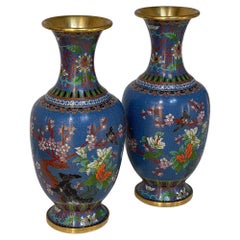Items Similar to Ota Jinnoei 1890 Imperial Meiji Period Pair of Cloisonne Cabinet Vases
Want more images or videos?
Request additional images or videos from the seller
1 of 5
Ota Jinnoei 1890 Imperial Meiji Period Pair of Cloisonne Cabinet Vases
$1,996per set
$2,495per set20% Off
£1,535.46per set
£1,919.32per set20% Off
€1,782.23per set
€2,227.79per set20% Off
CA$2,814.84per set
CA$3,518.55per set20% Off
A$3,153.09per set
A$3,941.36per set20% Off
CHF 1,656.12per set
CHF 2,070.15per set20% Off
MX$38,340.57per set
MX$47,925.71per set20% Off
NOK 20,971.85per set
NOK 26,214.81per set20% Off
SEK 19,907.92per set
SEK 24,884.91per set20% Off
DKK 13,301.46per set
DKK 16,626.82per set20% Off
About the Item
Pair of cloisonne vases designed by Ota Jinnoei.
Beautiful pair of small cabinet vases, created in Japan circa 1890, during the meiji Imperial period (1868-1912). These vases has been carefully crafted at the atelier of the cloisonne master Ota Jinnoei. Made in silvered bronze with applications of high polished cloisonne enamel, worked in silver wire and decorated with organic motifs of flowers trees and little birds.
Weight: 73.75 Grams, (47.27 Dwt).
Measurements: 89 mm by 50.8 mm (3.5 x 2 Inches).
Hallmarks: Both are stamped under the base with the maker's mark monogram associated to Ota Jinnoei.
Meiji period, is an era of Japanese history that extended from October 23, 1868 to July 30, 1912.The Meiji era was the first half of the Empire of Japan, when the Japanese people moved from being an isolated feudal society at risk of colonization by Western powers to the new paradigm of a modern, industrialized nation state and emergent great power, influenced by Western scientific, technological, philosophical, political, legal, and aesthetic ideas. As a result of such wholesale adoption of radically different ideas, the changes to Japan were profound, and affected its social structure, internal politics, economy, military, and foreign relations. The period corresponded to the reign of Emperor Meiji. It was preceded by the Keio era and was succeeded by the Taisho era, upon the accession of Emperor Taisho.
Cloisonné is an enamelling technique in which the pattern is formed by wires soldered to the surface of the object to be decorated, which is usually made from copper, forming cells or cloisons, each of which holds a single colour of enamel paste which is then fired, and ground and polished. The champleve technique also uses an enamelling technique, but the cells are formed by carving into the surface ot the object, or in the casting. The cloisonne technique has been in use since the 12th century BC in the west, but the technique did not reach China until the 13th or 14th century. It became popular in China in the 18th century. Initially bronze or brass bodies were used, and in the 19th century copper, at which time the quality of th eitems produced began to decline. Chinese cloisonné is the best known enamel cloisonné, though the Japanese produced large quantities from the mid-19th century, of very high technical quality. In the west the cloisonne technique was revived in the mid 19th century following imports from China, and its use continued in the Art Nouveau and Art Deco periods.
Collections: Victoria & Albert Museum, London United Kingdom Auckland Museum, Auckland New Zealand.
Collateral: They are accompanied by a presentation box.
Condition: The overall condition of this pair of vases is excellent. Beside the little normal wear, there is absolutely no damage These pieces has been carefully inspected to guarantee the condition and authenticity.
INVENTORY REF: D110822TENK/2.361
- Creator:Ota Jinnoei (Maker, Designer)
- Dimensions:Height: 3.5 in (8.89 cm)Width: 2 in (5.08 cm)Depth: 2 in (5.08 cm)
- Sold As:Set of 2
- Style:Meiji (Of the Period)
- Materials and Techniques:
- Place of Origin:
- Period:
- Date of Manufacture:1890
- Condition:Wear consistent with age and use. The overall condition of this pair of vases is excellent. Beside the little normal wear, there is absolutely no damage These pieces has been carefully inspected to guarantee the condition and authenticity.
- Seller Location:Miami, FL
- Reference Number:Seller: D110822TENK/2.3611stDibs: LU8303233495752
About the Seller
5.0
Gold Seller
Premium sellers maintaining a 4.3+ rating and 24-hour response times
1stDibs seller since 2023
206 sales on 1stDibs
Typical response time: 3 hours
- ShippingRetrieving quote...Shipping from: Miami, FL
- Return Policy
Authenticity Guarantee
In the unlikely event there’s an issue with an item’s authenticity, contact us within 1 year for a full refund. DetailsMoney-Back Guarantee
If your item is not as described, is damaged in transit, or does not arrive, contact us within 7 days for a full refund. Details24-Hour Cancellation
You have a 24-hour grace period in which to reconsider your purchase, with no questions asked.Vetted Professional Sellers
Our world-class sellers must adhere to strict standards for service and quality, maintaining the integrity of our listings.Price-Match Guarantee
If you find that a seller listed the same item for a lower price elsewhere, we’ll match it.Trusted Global Delivery
Our best-in-class carrier network provides specialized shipping options worldwide, including custom delivery.More From This Seller
View AllJapan 1890 Meiji Period Decorative Vase In Cloisonné Enamel With Wood Base
Located in Miami, FL
Japanese vase from the Meiji Period (1868-1912).
Beautiful antique decorative vase, created in Japan during the Meiji period (1868-1912), circa 1890s. It was carefully crafted in so...
Category
Antique 1890s Japanese Meiji Metalwork
Materials
Bronze, Enamel
$558 Sale Price / set
20% Off
JAPAN 1890-1900 Meiji Period Decorative Six-sided Vase In Cloisonné Enamel
Located in Miami, FL
Japanese vase from the Meiji Period (1868-1912).
This is a beautiful antique decorative vase created in the imperial Japan during the Meiji period (1868-1912), circa 1890s. It was c...
Category
Antique 1890s Japanese Meiji Metalwork
Materials
Gold, Bronze, Enamel
JAPAN 1910 Antique Bronze Vases With Silver & Gold Mixed Metals Flowers & Bird
Located in Miami, FL
Japanese vase from the Meiji Period (1868-1912).
This is a beautiful pair of antique decorative vases created in the imperial Japan during the Meiji period (1868-1912), back in 1910...
Category
Vintage 1910s Japanese Meiji Vases
Materials
Gold, Silver, Bronze, Copper
Japan 1890 Meiji Period Bronze Koro Censer in Cloisonne Enamel with Jade Lid
Located in Miami, FL
Japanese Koro from the Meiji Period (1868-1912).
Beautiful antique ten sides fluted koro censer, created in Japan during the Meiji period (1868-1912), ci...
Category
Antique 1890s Japanese Meiji Metalwork
Materials
Jade, Gold, Silver, Bronze, Enamel
$718 Sale Price / set
20% Off
Japan 1890 Meiji Shibayama Round Urn in Gilded Wood and Sterling Silver
Located in Miami, FL
Shibayama urm from the Japan meiji (1858-1912) period.
Gorgeous piece of art, created in the imperial Japan during the Meiji period, circa 1890. This is a little urn with a lid crafted in gilded wood, shibayama panels and sterling silver. Composed by a four footed round vase with two sterling silver handles in the shape of trees and the lid on top accented with the figure of a crab in sterling silver. The gilded wood is decorated with flowers, sea patterns and the imperial flower...
Category
Antique 1890s Japanese Meiji Antiquities
Materials
Multi-gemstone, Gold, Silver, Sterling Silver, Gold Leaf
$5,588 Sale Price / set
20% Off
Ando Jubei Japan 1950 Showa Period Cloisonné Enamel Green Bombe Vase
By Ando Jubei
Located in Miami, FL
Cloisonné enamel vase designed by Ando Jubei.
Beautiful piece of Japanese decorative arts, created by the Ando Jubei Company during the Showa...
Category
Vintage 1950s Japanese Showa Vases
Materials
Silver, Enamel
$1,198 Sale Price
20% Off
You May Also Like
Antique Pair Of Meiji Japanese Cloisonne Enamel Vases
Located in Long Island City, NY
A pair of identical antique Japanese copper vases with cloisonne enamel design. Late Meiji period, before 1912. Elongated baluster shape with pronounced neck. Floral ornament with bl...
Category
Antique Late 19th Century Japanese Meiji Metalwork
Materials
Enamel, Copper
Antique Pair Of Meiji Japanese Cloisonne Enamel Vases
Located in Long Island City, NY
A pair of identical antique Japanese copper vases with cloisonne enamel design. Late Meiji period, before 1912. Elongated baluster shape with pronounced neck. Floral ornament against...
Category
Antique Late 19th Century Japanese Meiji Metalwork
Materials
Copper, Enamel
Pair of Chinese Cloisonne Vases, 19th Century
Located in Marseille, FR
Pair of Chinese Cloisonne vases from the 19th century decorated with birds and flowers. A depression on one of the vases without gravit...
Category
Antique 19th Century Chinese Vases
Materials
Copper
$2,272 / set
Pair 19th Century Cloisonne Vases
Located in Dallas, TX
Pair 19th Century Cloissone vases is an extraordinary example of the breed, displaying its well-preserved, rich coloration and exhibiting a large format design theme celebrating the ...
Category
Antique 1890s French Meiji Vases
Materials
Brass, Enamel
$2,480 / set
Pair Of High Quality Meiji Japanese Cloisonne Vases
Located in Long Island City, NY
A beautiful pair of high quality antique Japanese Meiji Era brass and enamel vases, 1868 to 1912. Both are of a baluster form with elegant narro...
Category
Antique Late 19th Century Japanese Meiji Vases
Materials
Enamel
Pair of Antique Japanese Ormolu Mounted Cloisonné Enamel Vases
Located in London, GB
Of ovoid form with a pierced ormolu rim, decorated throughout with birds, flowers and foliage, raised on pierced ormolu feet; the enamel Japanese, the ormolu French, late 19th centur...
Category
Antique Late 19th Century Japanese Meiji Vases
Materials
Bronze, Enamel
More Ways To Browse
Imperial Mid
Small Cloisonne
18th Century Asia Brass
Cloisonne Collection
Japanese Cloisonne Bronze
18th Century Japanned Box
Japanese Vase With Stamp
Antique Cloisonne Boxes
Brass Bird Vase
Champleve Vase
13th Century Vase
Art Deco Japanese Vase
Meiji Period Cabinet
Asian Bird Box
Brass Vase With Birds
Japanese Bronze Flower Vase
Japanese Meiji Period Silver Vase
Silver China Cabinet
